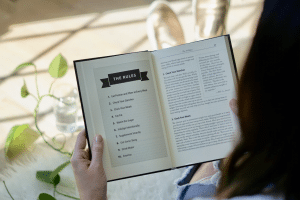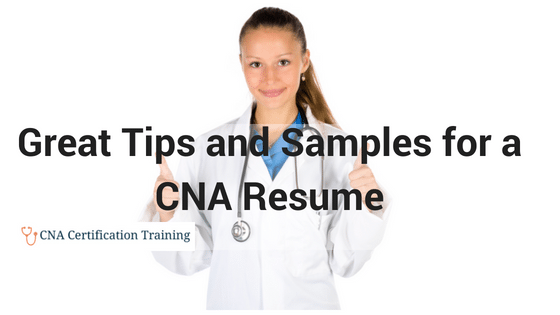Great Tips and Samples for a CNA Resume
As a Certified Nursing Assistant, your certification is critical – but it’s not the only thing that will get you the job. In order to land the job you want, you need a CNA resume that presents your qualifications in an impressive way. It’s not just enough to list your employment history. You need to make it clear why you’re the best of the best, so let’s take a look at a few tips for writing a stellar resume specific to the healthcare industry. Don’t forget to check out the samples at the end!
1. Master the Language
One of the most important things to learn in resume writing is how to write with action verbs. Begin every sentence with an action verb, and you create a resume with a stunning, confident voice that makes a bold impression. As you continue through the sections described in these tips, use this style of writing to avoid flat, passive descriptions.
One key part of language use, too, is using industry-specific terminology correctly and authoritatively. Double-check your terminology and ensure it tells a clear story without bogging your resume down in jargon.

photo credit to o-dan.net
Your contact information belongs at the top of your resume, before any of the more extensive resume content. By default, your contact information should include your name, address, phone number, and email address. For privacy concerns, some job seekers may choose only to include city, state, and zip while leaving off the actual street address. Don’t skip the address entirely, even if you choose to do this; employers need to know you’re local to the job.
Some also include a LinkedIn profile link. If you have great recommendations and connections on LinkedIn, this can be useful. Employers like to see what past employers and coworkers have said about you and be certain that you left a favorable impression.
3. Write Your Objective
The first impression employers have of you is your objective statement. This is usually not actually an objective unless you’re just starting your career; it’s usually a summary of professional qualifications. Shape it like an elevator pitch, using three to four sentences to sell your top qualifications and strongest skills.

photo credit to o-dan.net
4. Skills are Key
Did you know that a computer algorithm can stop your resume in its tracks? These are the algorithms used by applicant tracking systems (ATSs) to screen your resume for keyword matches before passing it to the next stage. No keywords mean no callback. After your objective, you should include a list of skills tailored to keywords and phrases for your target jobs.
5. Education First…
While in many industries, education is listed last, a CAN’s education is important enough to list before your work history. Often, externships and residencies make up a critical part of your education, and where you were trained and certified has to impact on employers.
List this section in reverse chronological order, beginning with your CNA certification, and always include the name of the awarding institution, along with the date and the name of your degree or certification. For many, you should also include state of issue.
6. …but Experience is Critical
While you don’t want to overwhelm employers with too much information, the experience section of your cna resume should still be the longest. Focus the majority of your attention here, and use concise bullets driven by action verbs to describe high-level statements of your daily duties at each job.
If you lack experience, you may need to fill this section with your externships and clinical experience. Regardless of whether you’re listing externships or a 10-year position, ensure you include a strong representation of achievements. These achievements show moments when you went above and beyond to deliver excellent results.
7. Trust Your References
In the healthcare industry, references can get you everywhere. You should include two references on your cna resume, preferably people who’ve worked with you in either senior positions or in team environments. List your references’ names, job titles, places of employment when you worked with them, phone numbers, and email addresses.
Make sure your references are aware and give permission. You usually can’t control what prospective employers will ask them, but nonetheless, you can also talk to them about what skills you’d like them to tout if they get that call.
8. Keep It Short
Your resume should never go over two pages, but ideally, you should aim for one page. A one-page resume offers a concise presentation of information that allows employers to take in your qualifications at a glance. Challenge yourself to cover all the pertinent details by writing smarter and using more impactful language, where you need fewer words to make a great impression.
9. Keep It Clean
Part of a great resume is also choosing a great format. You might think a splashy resume would make you stand out, but more complex design-oriented resumes often bury content amid distractions. They can also “break” on older computers or mobile devices, making them hard to read. Choose a simple, straightforward format with a clean presentation.

photo credit to o-dan.net
10. Double-Check Everything
Review your resume twice and then a third time for spelling, grammar, and punctuation. Make sure your format is consistent throughout. Also, check all your dates for accuracy – and definitely double-check your contact information. Employers can’t hire you if they can’t reach you because your contact information contains a typo.
Go Forth and Apply with your
CNA Resume
Once you’ve wrapped up your resume, go forth and apply to your target jobs. Remember that the key is persistence. While a great resume can improve your response rate, the best way to get a high volume of responses is to send out a high volume of applications. Make a goal to apply to a certain number of jobs per day. Set aside a specific time to look through your favorite job boards, select the jobs you’re most qualified for, and send your application in.
Tailor each application to be specific to the job you’re targeting. This may mean having a few versions of your resume that you can adjust to match keywords and requirements for each job. Go forth, and happy job hunting.

